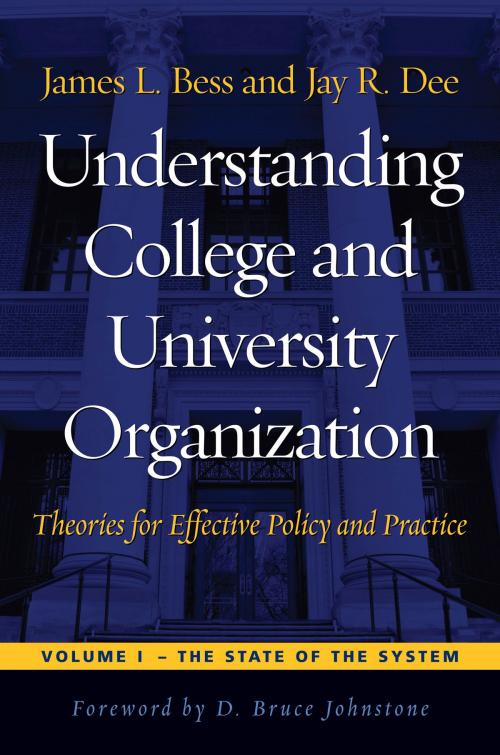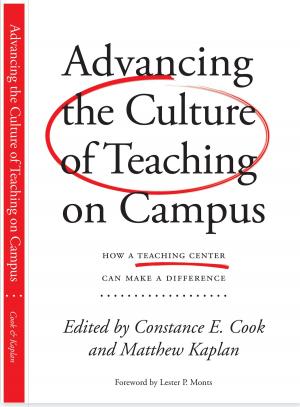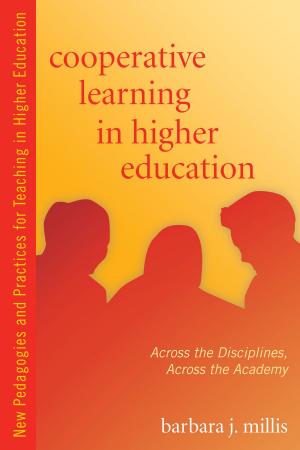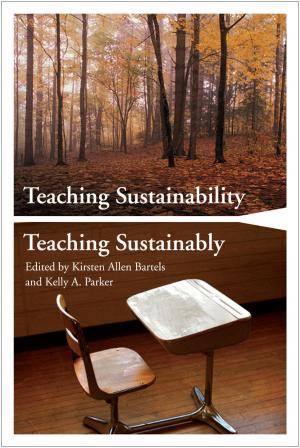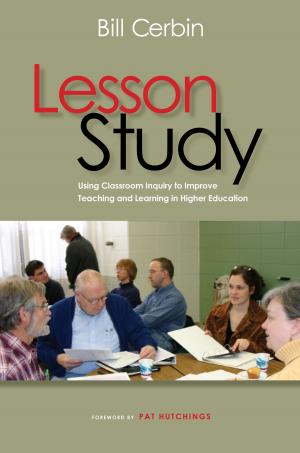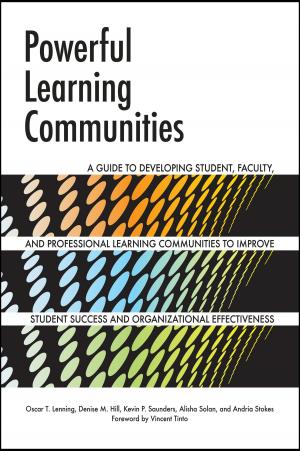Understanding College and University Organization
Theories for Effective Policy and Practice
Nonfiction, Reference & Language, Education & Teaching, Higher Education, Administration| Author: | James L. Bess, Jay R. Dee | ISBN: | 9781579227739 |
| Publisher: | Stylus Publishing | Publication: | April 19, 2012 |
| Imprint: | Stylus Publishing | Language: | English |
| Author: | James L. Bess, Jay R. Dee |
| ISBN: | 9781579227739 |
| Publisher: | Stylus Publishing |
| Publication: | April 19, 2012 |
| Imprint: | Stylus Publishing |
| Language: | English |
A Management Resource for Higher Education Leaders
“Quite simply a tour de force. Not only have the authors written by far the broadest and deepest theoretical analysis of college and university organization I've seen, but they have clearly organized a complex topic, and written it engagingly. This will be seen as a landmark work in the field. It should be required reading for all who claim to understand higher education institutions and the behavior that goes on inside and around them.”?David W. Leslie, Chancellor Professor of Education, The College of William and Mary
“An extraordinarily comprehensive treatment of the uses of theory to understand and manage organizations of academic life….recommended for every student of American higher education.” ?Theodore J. Marchese, Senior Consultant, Academic Search Consultation Service, and formerly Vice President of the American Association for Higher Education
The Comprehensive Textbook for Graduate and Master’s Courses
"The best introduction to organizational theory and its implications for higher education leadership/management that I have ever seen. By the end of the course, the students were in an excellent position to place current literature within a framework and relate it to the ‘big picture’ and what they already knew. It provided them with the conceptual lenses to navigate this convoluted intellectual terrain. This work is a treasure!"?Martin J. Finkelstein, College of Education and Human Services, Seton Hall University
"Not only did the text exceed my expectations, but I was amazed by how the students embraced the book’s theoretical perspectives. I highly recommend this textbook to master’s level instructors who seek to foster critical thinking about theory and practice."?Cheryl J. Daly, Director, College Student Personnel Master’s Program, Western Carolina University
This two-volume work is intended to help readers develop powerful new ways of thinking about organizational principles, and apply them to policy-making and management in colleges and universities.
It systematically presents a range of theories that can be applied to many of the difficult management situations that college and university leaders encounter. It provides them with the theoretical background to knowledgeably evaluate the many new ideas that emerge in the current literature, and in workshops and conferences. The purpose is to help leaders develop their own effective management style and approaches, and feel confident that their actions are informed by appropriate theory and knowledge of the latest research in the field.
The book offers readers the tools to balance the real-world needs to succeed in today’s challenging and competitive environment with the social and ethical aspirations of all its stakeholders and society at large. The authors’ aim is to elucidate how administration can be made more efficient and effective through rational decision-making while also respecting humanistic values. This approach highlights a range of phenomena that require attention if the institution is ultimately to be considered successful.
The Authors
James L. Bess is President of James L. Bess & Associates and Professor Emeritus at New York University, where he taught from 1980-2000. He is the author or editor of eight books and over fifty articles and book chapters.
Jay R. Dee is Associate Professor of Higher Education, Graduate College of Education, University of Massachusetts, Boston.
“Quite simply a tour de force. Not only have the authors written by far the broadest and deepest theoretical analysis of college and university organization I've seen, but they have clearly organized a complex topic, and written it engagingly. This will be seen as a landmark work in the field. It should be required reading for all who claim to understand higher education institutions and the behavior that goes on inside and around them.”?David W. Leslie, Chancellor Professor of Education, The College of William and Mary
“An extraordinarily comprehensive treatment of the uses of theory to understand and manage organizations of academic life….recommended for every student of American higher education.” ?Theodore J. Marchese, Senior Consultant, Academic Search Consultation Service, and formerly Vice President of the American Association for Higher Education
The Comprehensive Textbook for Graduate and Master’s Courses
"The best introduction to organizational theory and its implications for higher education leadership/management that I have ever seen. By the end of the course, the students were in an excellent position to place current literature within a framework and relate it to the ‘big picture’ and what they already knew. It provided them with the conceptual lenses to navigate this convoluted intellectual terrain. This work is a treasure!"?Martin J. Finkelstein, College of Education and Human Services, Seton Hall University
"Not only did the text exceed my expectations, but I was amazed by how the students embraced the book’s theoretical perspectives. I highly recommend this textbook to master’s level instructors who seek to foster critical thinking about theory and practice."?Cheryl J. Daly, Director, College Student Personnel Master’s Program, Western Carolina University
This two-volume work is intended to help readers develop powerful new ways of thinking about organizational principles, and apply them to policy-making and management in colleges and universities.
It systematically presents a range of theories that can be applied to many of the difficult management situations that college and university leaders encounter. It provides them with the theoretical background to knowledgeably evaluate the many new ideas that emerge in the current literature, and in workshops and conferences. The purpose is to help leaders develop their own effective management style and approaches, and feel confident that their actions are informed by appropriate theory and knowledge of the latest research in the field.
The book offers readers the tools to balance the real-world needs to succeed in today’s challenging and competitive environment with the social and ethical aspirations of all its stakeholders and society at large. The authors’ aim is to elucidate how administration can be made more efficient and effective through rational decision-making while also respecting humanistic values. This approach highlights a range of phenomena that require attention if the institution is ultimately to be considered successful.
The Authors
James L. Bess is President of James L. Bess & Associates and Professor Emeritus at New York University, where he taught from 1980-2000. He is the author or editor of eight books and over fifty articles and book chapters.
Jay R. Dee is Associate Professor of Higher Education, Graduate College of Education, University of Massachusetts, Boston.
A Management Resource for Higher Education Leaders
“Quite simply a tour de force. Not only have the authors written by far the broadest and deepest theoretical analysis of college and university organization I've seen, but they have clearly organized a complex topic, and written it engagingly. This will be seen as a landmark work in the field. It should be required reading for all who claim to understand higher education institutions and the behavior that goes on inside and around them.”?David W. Leslie, Chancellor Professor of Education, The College of William and Mary
“An extraordinarily comprehensive treatment of the uses of theory to understand and manage organizations of academic life….recommended for every student of American higher education.” ?Theodore J. Marchese, Senior Consultant, Academic Search Consultation Service, and formerly Vice President of the American Association for Higher Education
The Comprehensive Textbook for Graduate and Master’s Courses
"The best introduction to organizational theory and its implications for higher education leadership/management that I have ever seen. By the end of the course, the students were in an excellent position to place current literature within a framework and relate it to the ‘big picture’ and what they already knew. It provided them with the conceptual lenses to navigate this convoluted intellectual terrain. This work is a treasure!"?Martin J. Finkelstein, College of Education and Human Services, Seton Hall University
"Not only did the text exceed my expectations, but I was amazed by how the students embraced the book’s theoretical perspectives. I highly recommend this textbook to master’s level instructors who seek to foster critical thinking about theory and practice."?Cheryl J. Daly, Director, College Student Personnel Master’s Program, Western Carolina University
This two-volume work is intended to help readers develop powerful new ways of thinking about organizational principles, and apply them to policy-making and management in colleges and universities.
It systematically presents a range of theories that can be applied to many of the difficult management situations that college and university leaders encounter. It provides them with the theoretical background to knowledgeably evaluate the many new ideas that emerge in the current literature, and in workshops and conferences. The purpose is to help leaders develop their own effective management style and approaches, and feel confident that their actions are informed by appropriate theory and knowledge of the latest research in the field.
The book offers readers the tools to balance the real-world needs to succeed in today’s challenging and competitive environment with the social and ethical aspirations of all its stakeholders and society at large. The authors’ aim is to elucidate how administration can be made more efficient and effective through rational decision-making while also respecting humanistic values. This approach highlights a range of phenomena that require attention if the institution is ultimately to be considered successful.
The Authors
James L. Bess is President of James L. Bess & Associates and Professor Emeritus at New York University, where he taught from 1980-2000. He is the author or editor of eight books and over fifty articles and book chapters.
Jay R. Dee is Associate Professor of Higher Education, Graduate College of Education, University of Massachusetts, Boston.
“Quite simply a tour de force. Not only have the authors written by far the broadest and deepest theoretical analysis of college and university organization I've seen, but they have clearly organized a complex topic, and written it engagingly. This will be seen as a landmark work in the field. It should be required reading for all who claim to understand higher education institutions and the behavior that goes on inside and around them.”?David W. Leslie, Chancellor Professor of Education, The College of William and Mary
“An extraordinarily comprehensive treatment of the uses of theory to understand and manage organizations of academic life….recommended for every student of American higher education.” ?Theodore J. Marchese, Senior Consultant, Academic Search Consultation Service, and formerly Vice President of the American Association for Higher Education
The Comprehensive Textbook for Graduate and Master’s Courses
"The best introduction to organizational theory and its implications for higher education leadership/management that I have ever seen. By the end of the course, the students were in an excellent position to place current literature within a framework and relate it to the ‘big picture’ and what they already knew. It provided them with the conceptual lenses to navigate this convoluted intellectual terrain. This work is a treasure!"?Martin J. Finkelstein, College of Education and Human Services, Seton Hall University
"Not only did the text exceed my expectations, but I was amazed by how the students embraced the book’s theoretical perspectives. I highly recommend this textbook to master’s level instructors who seek to foster critical thinking about theory and practice."?Cheryl J. Daly, Director, College Student Personnel Master’s Program, Western Carolina University
This two-volume work is intended to help readers develop powerful new ways of thinking about organizational principles, and apply them to policy-making and management in colleges and universities.
It systematically presents a range of theories that can be applied to many of the difficult management situations that college and university leaders encounter. It provides them with the theoretical background to knowledgeably evaluate the many new ideas that emerge in the current literature, and in workshops and conferences. The purpose is to help leaders develop their own effective management style and approaches, and feel confident that their actions are informed by appropriate theory and knowledge of the latest research in the field.
The book offers readers the tools to balance the real-world needs to succeed in today’s challenging and competitive environment with the social and ethical aspirations of all its stakeholders and society at large. The authors’ aim is to elucidate how administration can be made more efficient and effective through rational decision-making while also respecting humanistic values. This approach highlights a range of phenomena that require attention if the institution is ultimately to be considered successful.
The Authors
James L. Bess is President of James L. Bess & Associates and Professor Emeritus at New York University, where he taught from 1980-2000. He is the author or editor of eight books and over fifty articles and book chapters.
Jay R. Dee is Associate Professor of Higher Education, Graduate College of Education, University of Massachusetts, Boston.
